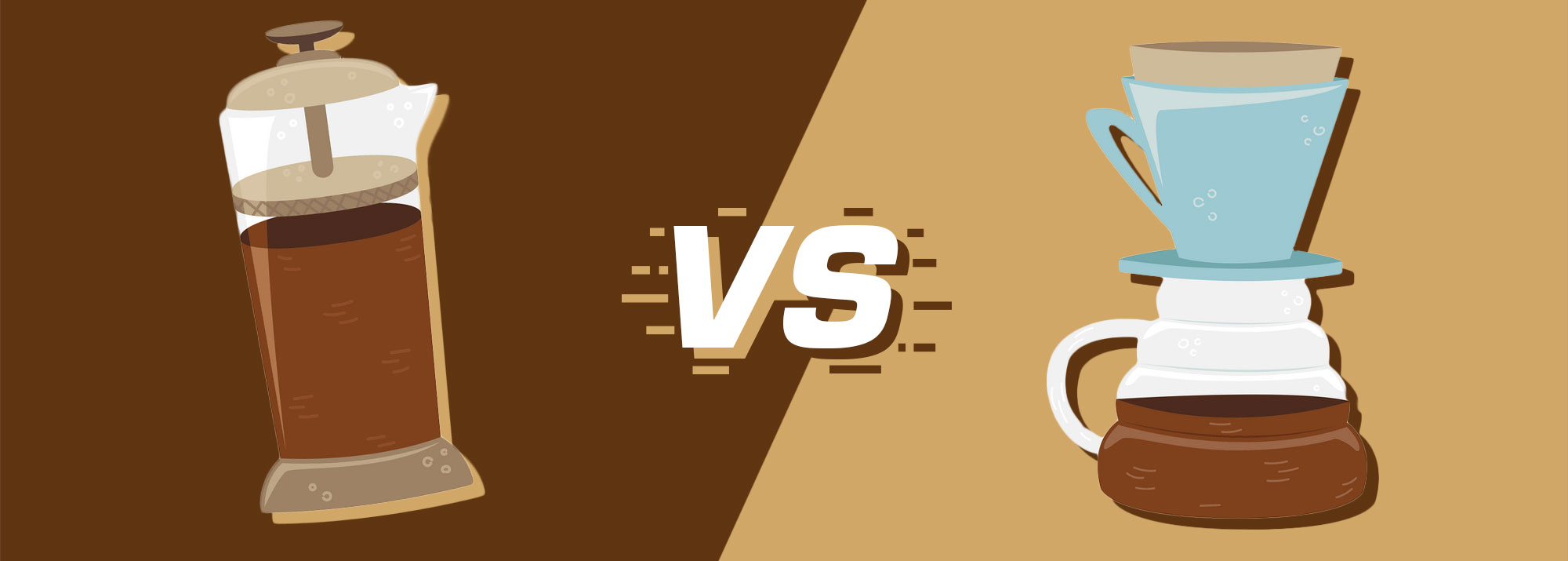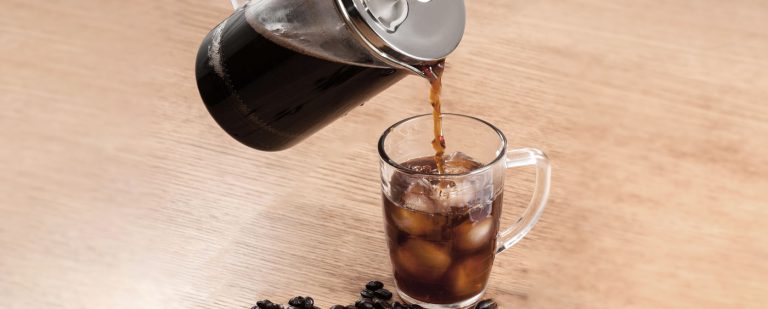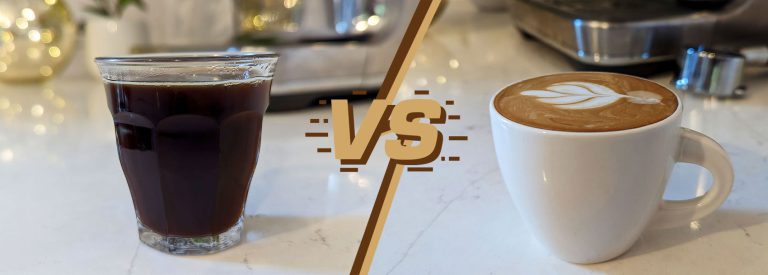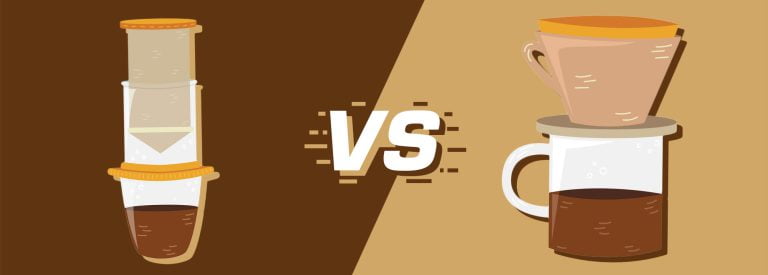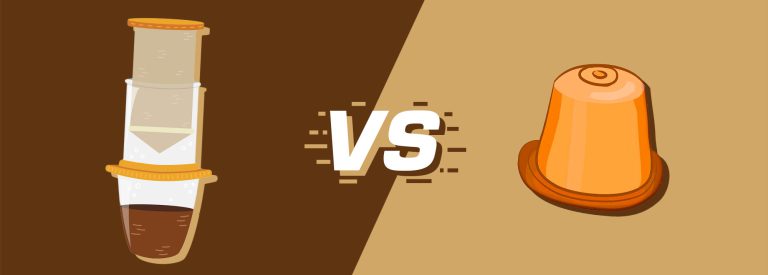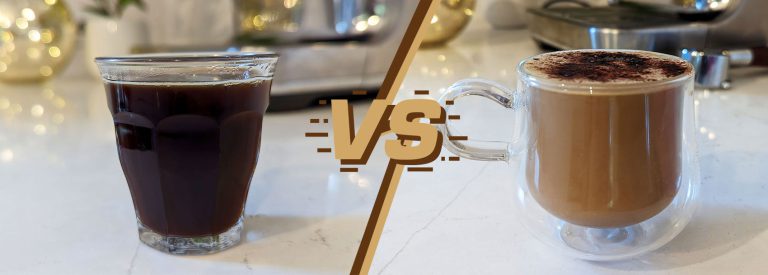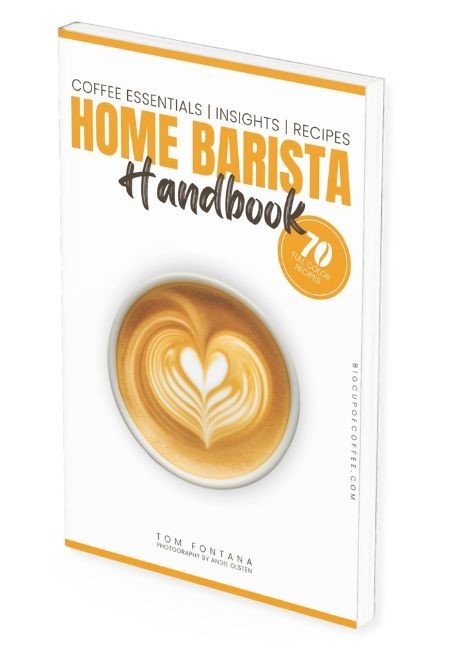French Press vs Hario V60 – Barista Answers Which Your Next Brewer Should Be
The French Press and Hario V60 are just two of the popular ways to manually brew delicious coffee, but I often get asked, which one’s better?
The thing is, there’s no simple answer to this comparison. But to help you make the choice of which brewer is perfect for you and your needs, I’ll discuss the different factors that set the French Press and Hario V60 apart from each other.
So ready your mug and let’s get into it.
Comparing French Press & Hario V60 – Which Method is Better?
So, which is better, the French Press or Hario V60? It depends on what you’re looking for in your coffee.
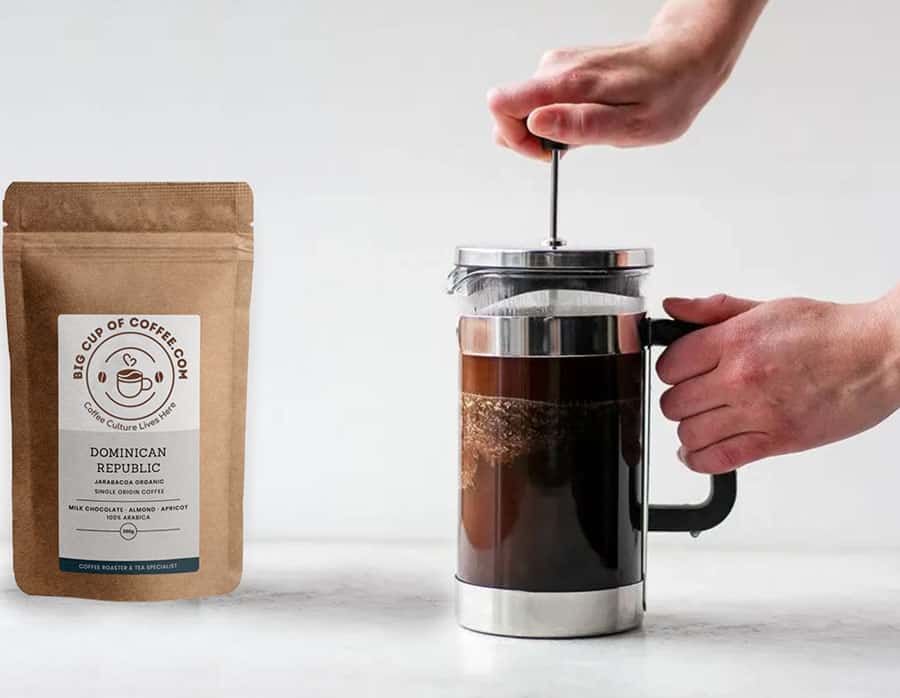
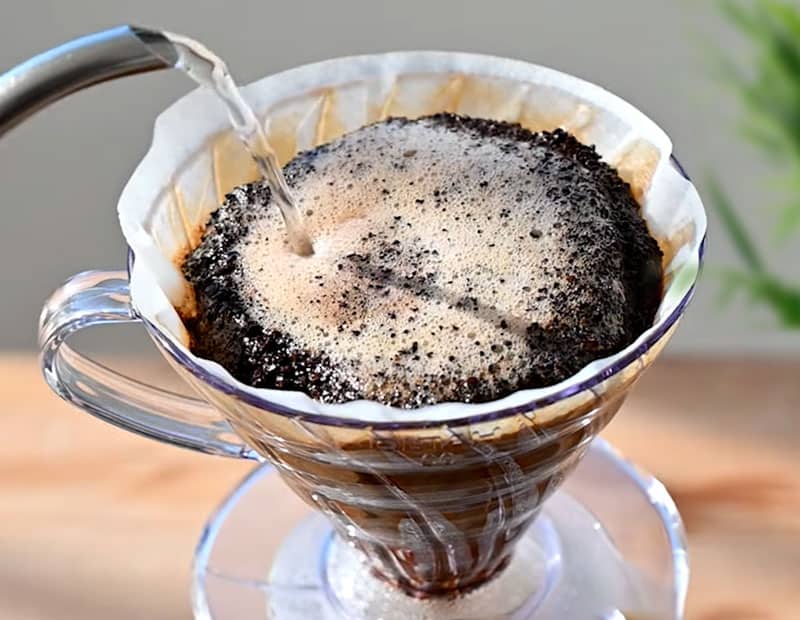
The French Press is a classic brewing method that involves immersion brewing. This means that the coffee grounds are fully immersed in hot water for a few minutes before being filtered out by pressing down on the plunger attached to a metal mesh filter.
Now onto the Hario V60, its V-shaped conical dripper with a 60° angle is what makes this pour-over coffee maker unique. It works by pouring hot water over a bed of ground coffee inside a cone filter paper placed in a funnel-like device called a dripper. Water passes through the grounds and the resulting coffee drips below into your carafe or mug.
Here are the factors to consider when picking between the two brewing methods, followed by a detailed comparison of each feature.
| Features | French Press | Hario V60 |
|---|---|---|
| Taste & Flavor | Full-bodied with robust flavors | Clean and bright brews |
| Strength | Strong coffee | Variable strength depending on the beans |
| Ease of Use | Simple immersion method | Requires pouring technique |
| Brewing Speed | 6-7 minutes | 5-7 minutes |
| Versatility | Limited to one type of coffee beverage | Highly customizable brewing process |
| Durability & Portability | Glass models are fragile, also comes in stainless steel variants | Various materials and options |
| Sustainability | Eco-friendly with recyclable components | Can be eco-friendly with reusable filters |
| Cost | Wide range of prices, no recurring costs | Affordable, but paper filter costs add up |
Taste, Flavor, & Strength
Both the French Press and Hario V60 have their own characteristics when it comes to flavor and strength. A French press produces coffee that is full-bodied with robust flavors depending on the type of beans used. The fact that the grounds are soaked in water for a prolonged period rather than passing through them makes this coffee stronger than the V60.
On the other hand, Hario V60 produces clean and bright brews that highlight the distinct flavor notes of each coffee bean. With its innovative design, this brewing method can produce anything from light and delicate cups to richer and bolder ones with the right kind of beans. The paper filter in the V60 also filters out most of the tiny coffee sediments, in contrast with the Franch Press, which will always have sediments since its metal mesh filter lets some through.
When it comes to taste and strength, I personally like the Hario V60 better as it offers more variety and complexity compared to the pretty limited yield of the French Press. So if you’re picky in flavors like me, go for the V60, but if you like your coffee strong, then the French Press might be a better choice.
Ease of Use
Which brewing device is easier to make coffee with? The French Press is relatively simple to use – all you need to do is immerse your medium-coarse to coarse ground coffee in hot water (195°F to 205°F), press down the plunger, and pour your coffee.
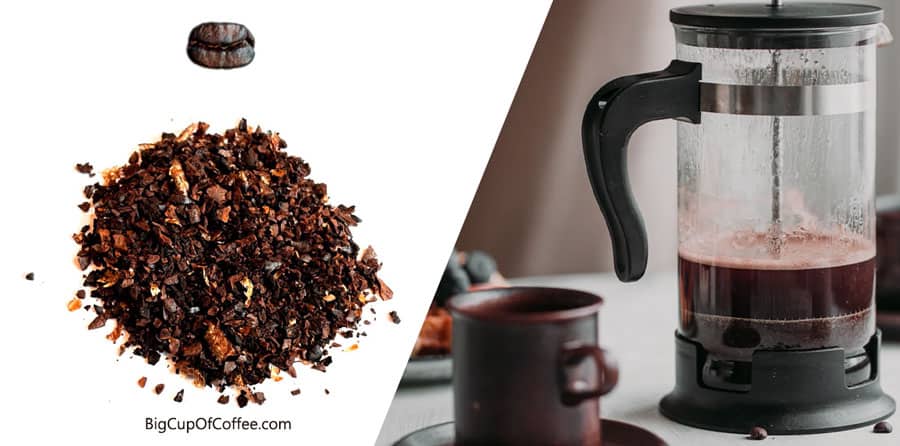
On the other hand, while using a Hario V60 may require a small learning curve when starting out due to getting the pouring timings and technique right, it isn’t really difficult at all. Using a gooseneck kettle, just pour your hot water (195°F – 205°F) into the bed of medium-fine ground coffee and let the dripper do the rest.
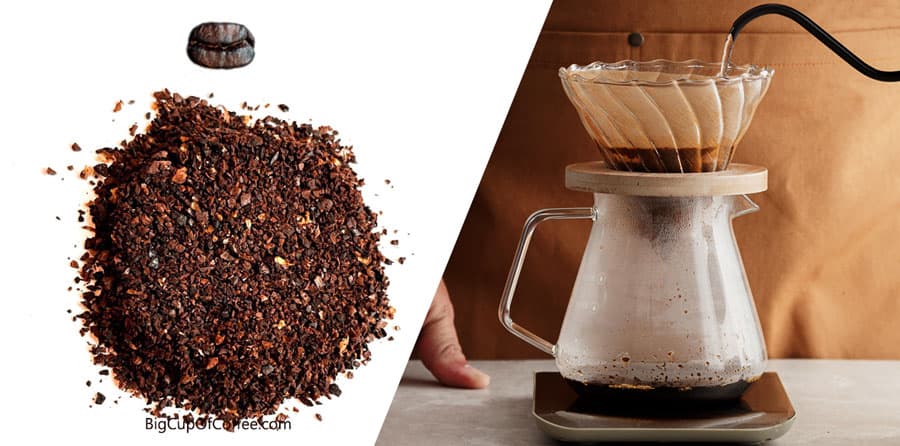
Overall, both brewing methods are fairly manageable even for beginners. But when it comes down to which is easier to use, I would say that the French Press wins because it’s simpler and there’s no careful pouring technique involved.
Brewing Speed
Now let’s compare how fast each brewer can make your coffee. With a total prep + brewing time of 6 to 7 minutes for making coffee with a French Press, grinding and cleaning included, compared to 5 to 7 minutes for the Hario V60, these methods are fairly evenly matched in this category.
While the French press requires a steeping time of about 4 minutes, the Hario V60 only needs 30 seconds to bloom before you pour the rest of the hot water. However, waiting for the V60’s drawdown into the carafe will take 3 to 4 minutes.
In terms of cleanup, the French Press does require some effort to disassemble and scrub out any remaining grounds, but it’s not too difficult. On the other hand, cleaning the Hario V60 is as simple as giving it a thorough rinse of its filter cone and carafe.
Overall, if speed is your main concern then the Hario V60 may be your best pick due to its shorter brewing time and easier cleanup.
Versatility
Versatility plays a crucial role in coffee brewing as it allows for experimentation and customization to suit one’s taste buds. The French Press is not very versatile since it only produces one kind of coffee beverage, unless you use it for cold brew coffee. But it does have a wide range of sizes to cater to your different needs:
- 3-cup (0.35 L)
- 4-cup (0.5 L)
- 8-cup (1 L)
- 12-cup (1.5 L)
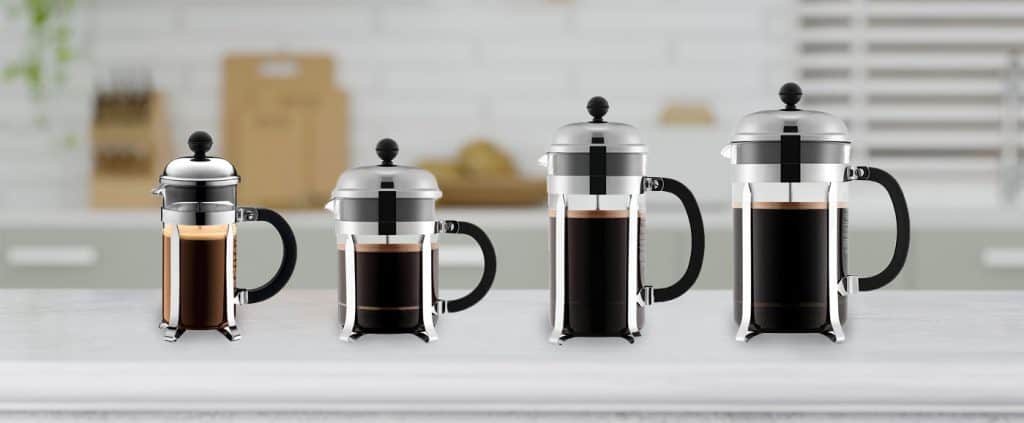
On the other hand, the Hario V60 pour over method provides an incredibly high degree of control over the brewing process. With this device, you can experiment with grind size, water temperature, pouring speed and technique, and water-to-coffee ratio resulting in a customizable cup of coffee that suits any preference. It also has three sizes available:
- 01 (1-2 cups)
- 02 (1-4 cups)
- 03 (1-6 cups)

When considering the versatility between these two methods, I would say that the Hario V60 takes the crown due to its ability to influence many factors that affect the flavor profile whilst providing consistent results.
Durability and Portability
If you’re looking for a coffee maker that can last long in your kitchen or is easy to bring with you wherever you go, then the durability and portability of each brewer are important factors to consider.
Classic glass models of French Press are often made with borosilicate glass which handles heat and thermal shock without issues, but they are still prone to breaking if you drop them or hit them against something. But fret not, stainless steel models exist and they are great for camping trips or outdoors without you worrying they might shatter in your bag.
In contrast, ceramic or glass models of Hario V60 may not be that sturdy but they still hold up well over time. There are also options like metal, copper, and plastic that provide better durability.
As for portability, the French Press is undoubtedly bigger and heavier, since you can just bring the Hario V60 dripper and drip your coffee straight into a mug. Since it’s more portable, I often use the V60 when I’m out camping, although there was one time when a strong gust of wind disrupted my brewing, so just keep that in mind.
Sustainability
Get your coffee right not just for your palate, but also for the planet. When choosing a brewing method, sustainability should also be a key factor to consider.
French Press is an eco-friendly option because it is primarily made with recyclable glass and stainless steel bodies. It also has no disposable components like paper or plastic filters, further reducing your carbon footprint every time you brew.
In comparison, the Hario V60 can still be eco-friendly if you use a reusable metal or cloth filter and if you pick one made with sustainable material. It does have its downsides since there are plastic V60 models and the use of paper filters is more common. It’s worth noting though that the V60 filters are compostable.
Both French Press and Hario V60 have unique sustainable elements but all things considered, the French Press is more eco-friendly overall.
Cost
Let’s talk about the cost of these two popular coffee makers. French Presses vary in price depending on size and material with prices ranging from around $20 to over a hundred dollars. However, once you make that initial purchase, there are no additional operating expenses.
In contrast, Hario V60s are generally more affordable and priced between $10 to $50. But hold up, there is an added cost due to paper filter usage. In 2025, each filter costs roughly eight cents, which may not sound like much, but can add up over time if you make several cups per day.
When it comes to cost, I think the French Press is more cost-efficient. It may be a bit pricier, but there are no recurring costs to worry about. As long as you have the grounds and water, you’re good to brew.
French Press and Hario V60 – Weighing the Pros & Cons
Now that we’ve gotten a closer look at the features of each brewing method, here’s a quick overview of the pros and cons of French Press and Hario V60 so you can finally decide which one is for you:
| Brewing Method | Pros | Cons |
|---|---|---|
| French Press | – Easy to use – The glass material offers decent heat retention – Stainless steel models offer durability | – Some sediments may get into your drink – Common glass build is prone to breakage. |
| Hario V60 | – Various materials and sizes for different needs – Produces delicious coffee with low acidity – More versatile | – The pouring technique needs practice – The use of paper filters produces waste |
Check out how French press also compares to other brewers:
You can also read my comparisons between Hario V60 and other brewing methods:
Conclusion
To conclude the French Press vs. Hario V60 comparison, each brewing method has its own advantages and drawbacks.
If you want simplicity and sustainability in brewing strong coffee, then the French press is for you.
But if you prefer faster brewing with a highly portable device, then you’d want to enjoy Hario V60’s versatile and clean brews.
Personally, my preference lies with the Hario V60 due to its outstanding taste that I can tweak with my pouring technique. But at the end of the day, the quest to find the right brewer is really subjective. So let me know in the comments which one you prefer.

